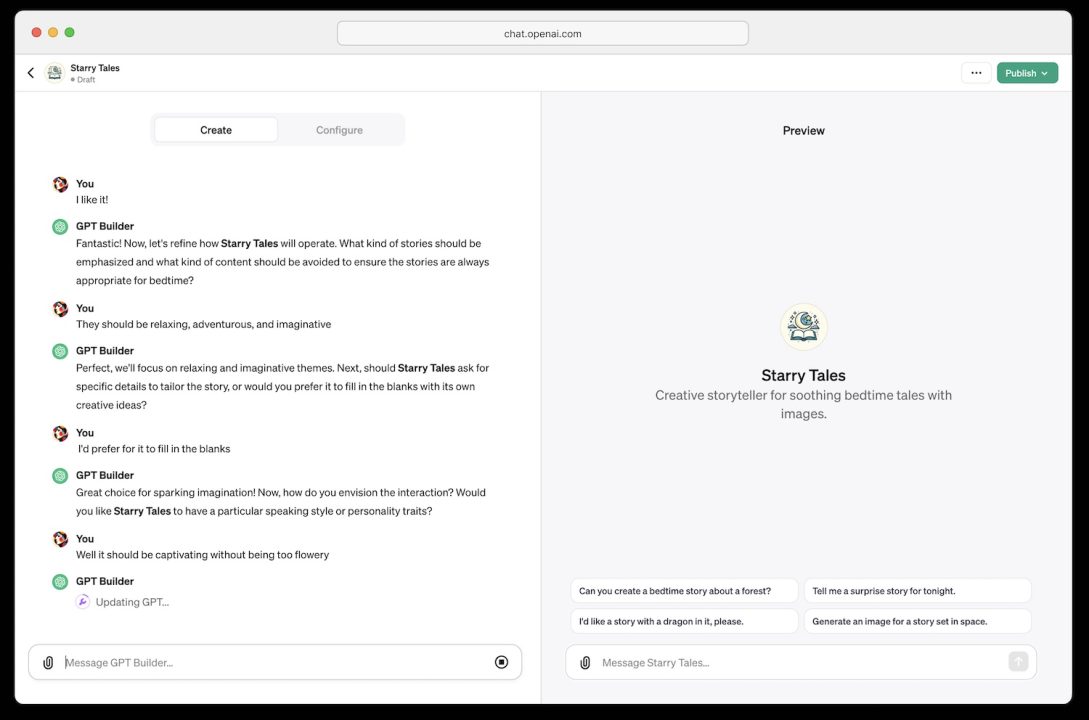OpenAI took over the lease (and “chat”) from ChatGPT today with the announcement of GPT, a way for anyone to create their own version of the popular conversational AI system. Not only can you create your own GPT for fun or productivity, but you’ll soon be able to publish it on a marketplace they call the GPT Store – and maybe even make a little cash in the process.
Thank you for reading this post, don't forget to subscribe!The new features, announced today along with several others at OpenAI’s first developer day in San Francisco, signal a more pragmatic approach to the AI market, which has until now been defined by a few dedicated general-purpose systems. In fact, the systems are said to be becoming even more general-purpose with new capabilities, but the AI giant has clearly taken a page from Apple’s book, noting that the platform owes much to the ingenuity of others. Becoming is at least as valuable as being one’s own simplicity.
“We believe that if you give people the tools, they will do amazing things,” founder and CEO Sam Altman said on stage.
To this end the company is introducing GPT, which it calls “custom versions of ChatGPT that you can create for a specific purpose.” (And yes, you can expect some confusion at that point, because GPT, or “Generative Pretrained Transformer” is actually the technical term for this type of large language model.)
GPT can be created without any coding experience, and as he explained, it can be as simple or complex as you like.
For example, you can train a GPT on your recipe collection to instantly ask you what ingredients you need for that soup. Or you can ask it to get information about a huge fantasy series so you can ask it “Wait, who is Sir Roderick Random?” And if you’re more serious-minded, as a developer or company you can have a GPT trained on all your proprietary code, so that others can quickly check your style or generate cohesive code.
It is possible to create a GPT simply by chatting with ChatGPT and describing what you want – we will be able to test this soon.
“You can actually program GPT with the language, by talking to the language,” Altman said. “It’s easy to customize the behaviors so they do what you want – it makes them very accessible and gives everyone agency.”
He demonstrated this on stage under the heading “New GPT Draft”, telling ChatGPT that he wanted to create a bot that would advise founders on how to improve their startup. Then he uploaded a lecture he gave on the topic, described it as concise and creative, and decided it was ready to go.
You’ll also be able to bring in external services, like sending an unsupported language to the translation API – but users will be able to choose whether their data can be managed this way.
An app store for AI
Perhaps the most impressive of all the announcements today was OpenAI’s GPT Store, which will be the platform on which these GPTs will be distributed and ultimately monetized.
Later this month, we’re launching the GPT Store, featuring creations from verified builders. Once in the store, GPTs become discoverable and can climb leaderboards. We’ll also highlight the most useful and enjoyable GPTs that fall into categories like productivity, education, and “just for fun.” In the coming months, you will also be able to earn money based on how many people are using your GPT.
Sound familiar? The App Store model has proven incredibly attractive to Apple, so it should come as no surprise that OpenAI is attempting to replicate it here. GPTs will not only be hosted and developed on the OpenAI platform, but will also be promoted and evaluated.
Altman said, “We’re going to pay a portion of our revenue to the people who create the most used and most useful GPTs,” and that they are “excited to share more information soon.”
It is unclear at this point whether there will be the ability to simply charge fees for your GPT, or whether it will be strictly revenue sharing. When I asked him later, he said he expected the strategy to evolve greatly, first with direct revenue sharing (of unspecified magnitude), and later the possibility of subscribing to individual GPTs if there was demand.
It’s unclear who these “verified builders” actually are, but it’s likely a barrier to prevent low-effort and scam content from getting in your way. (This comes later.) But they demonstrated Code.org, a GPT built by TripAdvisor. And Canva, so it may be that at first it’s going to be a more official app rather than individuals’ GPT experiments.
OpenAI is clearly aiming high here, and the decision to establish itself as a platform independent of existing app stores and distribution methods puts it directly at the mercy of industry leaders like Apple and even its perennial patron, Microsoft. Could put him in conflict with the giants. Apple may take up the issue of monetizing the GPT model without cutting through the Apple Store, so OpenAI will have to tread lightly here.
And Microsoft is about to introduce its own CoPilot models specific to functions like Office tools, and it certainly looks like GPT could move into those enterprise-level models.
CEO Satya Nadella appeared on stage briefly to reiterate how excited he is about the partnership, but there’s definitely a sense that OpenAI is the one taking the lead and Microsoft is pushing itself into a supporting role. How long can that relationship remain friendly? At least it can be said that the next few years will be interesting.
The details of the GPT stores are evolving as OpenAI is entering them during the day. We will update this post as soon as we get more information.
Source: techcrunch.com






